
2019 legislative wrap up—the session is considered to be one of the most significant in years.
Bills on energy, guns, elections, health care and economic security pass
Sometime in the future, when your utility bill changes, your child goes to kindergarten, you vote for president, get arrested, fill a prescription or need some weed delivered, think of the 2019 session of the Colorado General Assembly.
The legislative session that adjourned on May 3 passed a long list of measures touching on many areas of government and life, and those bills likely will affect most Coloradans for years to come.
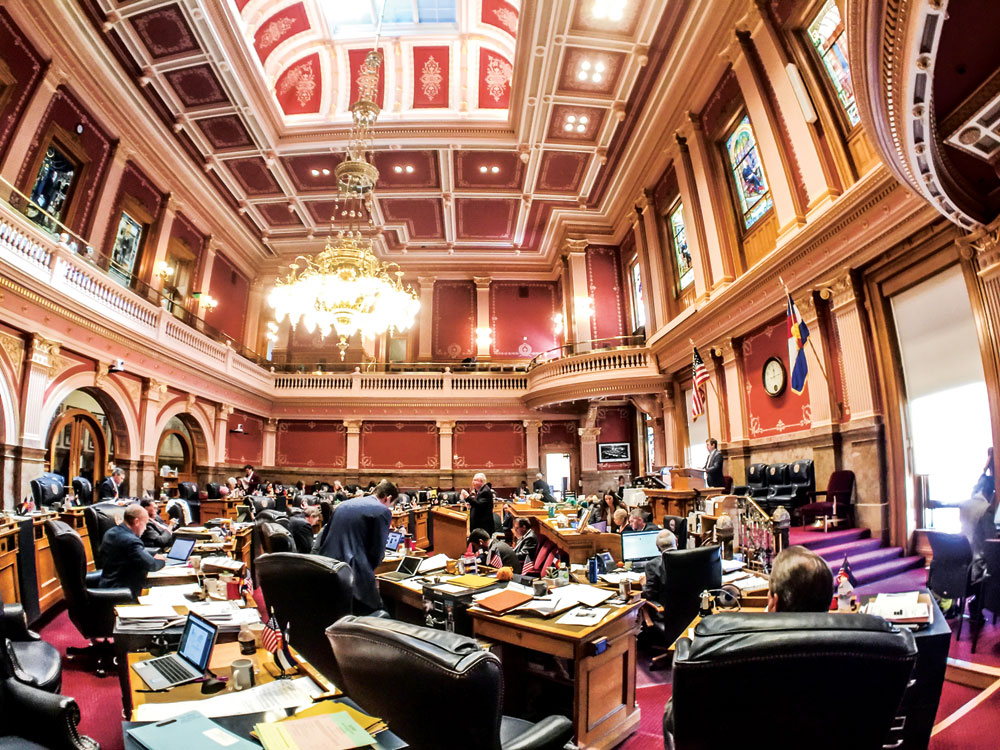
Last day of the legislative session that wrapped up on May 3.
The session is considered to be one of the most significant in years, and the reason for that goes back to the 2018 election. After winning control of the governor’s office and both chambers of the legislature, Democrats started the session with an aggressive list of policy proposals on health care, the environment, firearms safety, election reform, middle class economic security and more.
Republicans, who previously controlled the Senate and could block Democratic proposals, didn’t know what hit them. At times they responded petulantly with procedural gimmicks like requiring the full texts of bills be read aloud. (Democrats spared the vocal chords of House and Senate clerks by having bills “read” by text-to-audio conversion software on laptops.)
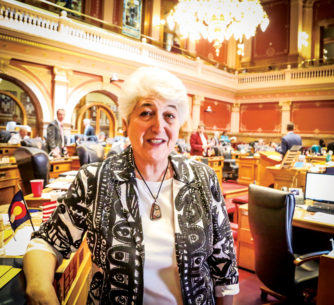
Sen. Lois Court, Senate District 31
includes Lowry, Mayfair and Montclair
Some interest groups, alarmed by Democratic goals for energy, immunizations, sex education and other issues, marshaled their troops via social media and packed committee hearings with hundreds of witnesses. In one case, that dragged out a hearing until 4:30 a.m.
Despite all that, the majority party achieved significant success on most of its priority issues. The highest profile measures were oil and gas regulation, the “red flag” gun bill, the national popular vote bill proposal and a long-term climate action plan.
Significant failures included a measure to abolish the death penalty, which its sponsor withdrew in the face of opposition, and Gov. Polis’ proposed tobacco and vaping tax, which was defeated with a bipartisan majority on the Senate floor. The other major loss was the bill that would have tightened paperwork requirements for reporting an immunization exemption. Facing opposition and a possible filibuster, Senate Democratic leaders let it die.
There also were bipartisan accomplishments in several areas, including school finance, other education issues like full-day kindergarten, criminal justice reform and a $100 million boost in transportation funding. Bills were passed addressing the following big issues:
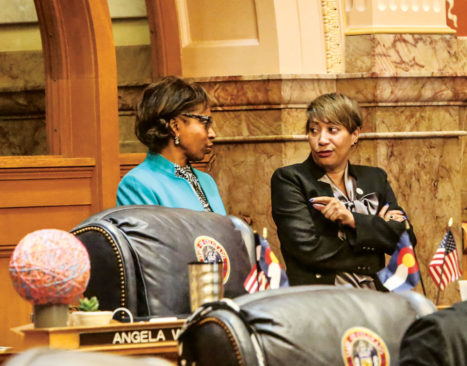
Sen. Angela Williams, Senate District 33
includes Stapleton and Park Hill
Williams (right) talks to Sen. Rhonda Fields shortly before the 2019 session ended. The rubber band ball on her desk in the Senate Chamber gets dropped from the top of the dome on the last day when the session closes.
Economic Security
Democrats have long pushed for measures to improve middle class economic security, and this session saw bills on tenants’ rights, affordable housing, wages and more.
The majority party had mixed success in this area, as exemplified by a family leave proposal that originally would have created a massive state insurance program funded by employers and workers, a fund that participants could have tapped to support themselves while taking time off to care for new babies, aging relatives and the like. Concerns about how to pay for the plan and business worries led to the bill being reduced to a series of studies on the idea’s feasibility.
A cherished Democratic goal was achieved with passage of an “equal pay” bill intended to reduce gender gaps and promote equal pay for equal work by creating new wage discrimination standards and transparency requirements.
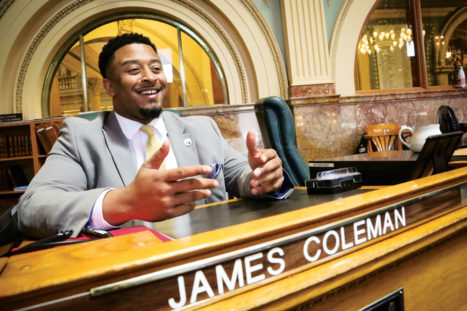
Rep. James Coleman, House District 7
includes all of Stapleton and the area of Park Hill/East Colfax east of Magnolia and north of Montview Blvd.
Education and Youth
Work in this area was largely bipartisan, and Polis played a big role in pushing state financial support of universal full-day kindergarten.
Lawmakers also moved to reform the state literacy program for K-3 students, reduce the use of expulsion and suspension for early-grades students, and expand opportunities for students to take college classes while still in high school.
Energy and Environment
One of the most significant bills of 2019 put tighter controls on oil and gas development, requiring state regulators to give greater priority to public health and safety, and allowing local governments some regulatory control over drilling and production.
Another major environmental measure laid out a multi-year regulatory plan for reducing greenhouse gas emissions. Democrats also pushed through measures intended to encourage greater use of electric vehicles.
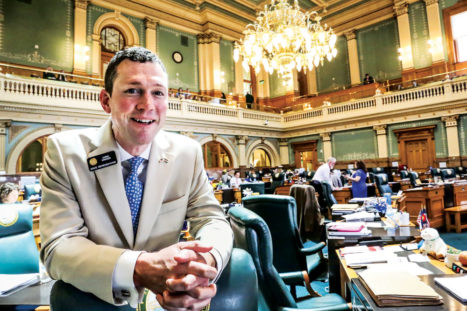
Rep. Chris Hansen, House District 6
includes Lowry, Mayfair and Montclair
Health Care and Costs
Major measures included requirements for greater financial transparency by hospitals, creation of a state reinsurance program to help cover high-cost cases, and a proposal to study future health care financing options for the state.
On consumer issues, lawmakers passed measures to require greater disclosure about out-of-network charges, cap patient payments for insulin and take the first steps toward allowing importation of Canadian prescription drugs into Colorado.
There were mixed results for two highly controversial health-related bills.
HB 19-1032 set additional requirements for school districts that choose to offer comprehensive sex education, including a ban on offering just abstinence-only programs and a new requirement for offering information about consent.
HB 19-1312 didn’t fare as well and was allowed to die on the last day of session in order to avoid delaying other bills. It would have required parents who want exemptions from school immunization requirements to file forms with state or local health offices rather than turn in handwritten notes at schools.

Rep. Leslie Herod, House District 8
includes Park Hill from Monaco to Colorado, East Colfax, and the area of Stapleton bounded by Central Park Blvd, E 28th Ave, Beeler St, and Montview Blvd.
Justice and Public Safety
The hottest issue in this area was HB 19-1177, the so-called “red flag” bill that will allow court orders for removal of weapons from people deemed a threat to themselves or others.
Other criminal justice bills were less controversial. Those include elimination of cash bail for some lower-level charges, the “ban the box” bill to prevent employers from asking about criminal records on initial job applications and a measure to speed pre-trial release for some people accused of crimes.
Marijuana Regulation
Lawmakers approved use of medical marijuana to treat autism and for some substance abuse disorders, loosened some current restrictions of ownership of marijuana companies, authorized marijuana “hospitality establishments” and created a licensing system for marijuana delivery.
State Government
The most controversial issue here was Colorado’s participation in the national popular vote movement, passed as SB 19-042. This commits Colorado to an interstate compact that will take effect when joined by states that represent at least 270 electoral votes. Those states would commit to casting their electoral votes for the winner of the national popular vote. (States with a total of 189 votes already have signed on.)
Legislators referred two financial decisions to voters in November. One asks if voters want to remove the state’s annual revenue and spending cap, which would end taxpayer refunds under the Taxpayer’s Bill of Rights. The other asks voters if they want to legalize sports betting, with revenues used to fund the state water plan.
Substance Abuse
A legislative study committee has been working for two years on proposals to combat the opioid epidemic and other substance abuse problems.
Some progress was made this session, including passage of measures to expand housing options for people with substance abuse disorders, create a database of treatment facilities, broaden a medication-assisted treatment pilot program, require electronic prescribing of controlled drugs, promote wider availability of drugs that reverse overdoses and take steps to better prevent substance abuse.
Todd Engdahl runs Capitol Editorial Services, a research company that provides services to lobbying firms and advocacy groups at the Colorado legislature. He’s a former executive city editor of The Denver Post, launched DenverPost.com and was a co-founder of the website Education News Colorado.
Northeast Denver’s five Democratic legislators were at the center of many of the biggest 2019 issues.
Sen. Lois Court, who is president pro tem of the Senate, was a prime sponsor of the “red flag” gun bill and of the revenue cap proposal that will be sent to voters. She also tried again with a bill to limit cell phone use while driving but was not successful.
Sen. Angela Williams was a prime sponsor of the greenhouse gases bill, the family leave measure and the unsuccessful death penalty repeal, as well as being a prime sponsor of health care and renters’ rights bills.
Rep. James Coleman teamed up with Sen. Williams on a highly publicized bill so occasional businesses—like kids’ lemonade stands—aren’t subject to city licensing requirements.
Rep. Chris Hansen, a new member on the Joint Budget Committee this session, also was a prime sponsor of six energy-related bills, including reauthorization of the Public Utilities Commission.
Rep. Leslie Herod was a highly visible leader on criminal justice and a prime sponsor of a dozen bills in that area, including bail reform.



0 Comments